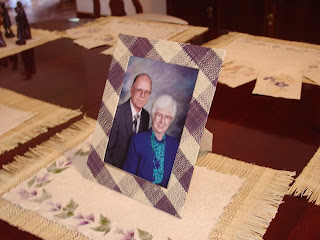My reasons for bidding on a job that would take me to Africa were quite selfish, but once I was assigned, I began to feel called to go there. Once I arrived in Madagascar, I was determined to keep my eyes, ears, and heart open in case the reason for the call was there. Instead, I found what others were called to do in Madagascar. Kathy's call was Akany Avoko.
 |
| Kathy and Gary |
Kathy was one of two family members who shared responsibilities of the community liaison officer position. She and her husband Gary, the assistant regional security officer, lived next door. For much of the time I was in Madagascar, Gary was on temporary duty in Liberia where a second civil war had been tearing the country apart since 1999. In July 2003, two months before I arrived in Madagascar, the U.S. sent in troops to Monrovia near the embassy which had been under attack earlier. The result was a big gift for me as I had Kathy as my personal guide.
Kathy had learned of
Akany Avoko, a children's home and school just outside of Antananarivo, and she was drawn to it immediately. Kathy included the school in many of the cultural activities she organized for the embassy. The managers of the home and the school were careful to ensure that it not be referred to as an orphanage. Some of the children were orphans, but many had been left with the home by families when the parents could not afford to keep them or had been removed from families when the children suffered from abuse. In addition, once a child reached a certain age, he or she could not be adopted. And if a child that age had younger siblings, those younger children also would not be adopted as they did not want to separate the siblings.
 |
|
 |
back of label of earrings made by
children at Akany Avoko Children's Home |
|
earrings made by children at Akany
Avoko Children's School |
The children who could no longer be adopted remained at the school until they were able to live on their own. In order to ensure they could support themselves and care for other family members when they left the home and school, they were given training in skills such as carpentry or sewing, embroidery, and other crafts. The home and school sold their work to raise funds to support it.
 |
samples of raffia photo frame and placemats and decorative
handmade paper |
Nearly all of the items the children produced relied on materials that they recycled. From soft drink and beer cans, the children would cut out designs, sometimes incorporating letters or other design elements from the cans into earrings, bracelets, and necklaces. The children were also taught to weave raffia, a native plant (the finest raffia in the world comes from Madagascar), and to create decorative paper from a variety of plants. These were items that Kathy arranged to have available for embassy staff to buy as Christmas gifts.
 |
assistant public affairs officer Paul
at the embassy's Christmas party |
As Christmas drew closer, Kathy, Paul, and I went to Akany Avoko for the school's Christmas program. It was held during the afternoon since electricity wasn't reliable at the school. In fact, when the program was about to begin, the electricity went out and the program had to be delayed until the power was restored or batteries could be found for the cassette tape player that provided the music for much of the program.
The school was managed by a Frenchman and his Malagasy wife. As the wife opened the program, she explained that the music and dance in the show was possible due to volunteers from a musical group in Antananarivo who offered classes in music, art, and dance for the children. She further explained that the addition of these cultural lessons to the curriculum of the school had made a tremendous difference for many of the children. Where there had been discipline challenges before music, art, and dance were part of the lessons, there were no discipline problems afterwards. Children who had previously been bored in traditional lessons found something that excited them in music and dance. And the program made that very clear.
If I had been able to spend more time in Madagascar, I would have enjoyed spending more time at Akany Avoko. But it was Kathy's call, not mine.





No comments:
Post a Comment